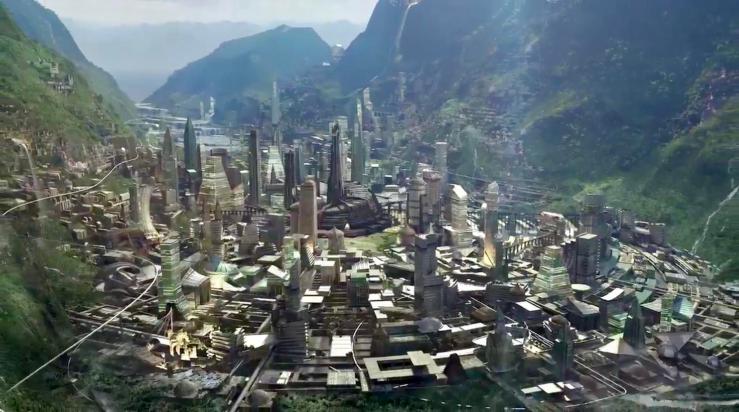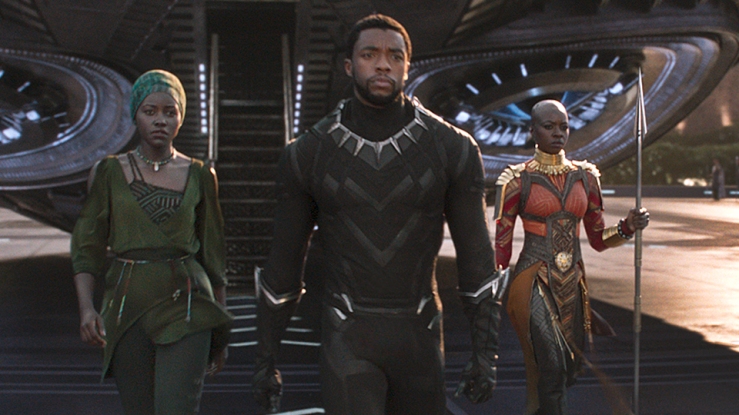Into the Spotlight
T’Challa, the Black Panther, and King of Wakanda, made his appearance in the Marvel Cinematic Universe in “Captain America: Civil War”. Both the events of that movie and his resulting character arc is referenced through exposition and flashbacks, where the new king of the utopian nation received the title of king and came to terms with his father’s assassination. Chadwick Boseman portrayed the king/superhero with understated intensity that comes from innate authority, and with good reason.
Black Panther is an insanely powerful superhero. He wears a suit made entirely from vibranum, the same indestructible metal as Captain America’s iconic shield, is an expert detective, tactician, hand-to-hand combatant, statesman and is sovereign to a nation that secretly is wealthy and advanced beyond measure. Added to that is his mysticism, rituals that grant him superhuman speed and strength and enhanced senses. He has all the powers of Captain America, Daredevil, and Iron Man, with a net-worth that would leave Tony Stark, Bruce Wayne, and Lex Luthor all crying themselves to sleep for envy.
The question wasn’t if he was going to get his own movie, but when.
As it turns out, there were talks of a “Black Panther” movie as early as the 1990’s, before Wesley Snipes opted to play the vampire-hunter “Blade” instead. The project had gone back and forth for decades until the MCU’s string of monumental successes made it clear that this wasn’t a box-office risk, but an overdue welcoming to the family.

All Hail the King
To keep things spoiler free, this review will only briefly recap the history of the Black Panther character and surmise the plot of the movie.
Black Panther originally went by a few aliases, including Coal Tiger and Black Leopard, and even though the character predates the Black Panther Party there was still some controversy over the name. He was arguably the first black superhero, certainly the first with actual superpowers. His debut was part of the Fantastic Four storyline, which later expanded when Jack Kirby returned from a brief stay at rival DC Comics, bringing his artwork to further expand the science-fiction setting of Wakanda.
Jack Kirby is probably best known for his work creating the mythical/alien cultures of both Marvel’s “Thor” (with a reimagining of the Norse gods homeworld Asgard) and the New Gods of DC Comics (residing on the fictional planets New Genesis and Apokolips). Just as it was in the Marvel “Thor” movies, the chance to see his designs for the high-tech city of Wakanda is one comic fans would certainly relish.
It’s fitting then that the movie is more a story of the culture and legacy of Wakanda, rather than the individual characters who populate it. Just as in “Civil War”, Wakanda is a fictional African nation that masquerades as a third-world country to hide the fact that it is technologically advanced paradise, the result of a meteor that crashed millennia ago made of the outrageously precious metal vibranium. The audience is quickly pulled into culture behind the masquerade, the tribes living in peace, but the issues of isolationism and traditionalism opposed to progress and encroaching global strife plague the utopia.
The legacy of the Black Panther is tied intricately to Wakanda, as told in the opening narration and shown throughout the film; the hero is clad in vibranium, wields vibranium claws as weapons, and eats from a mystical plant that grants powers and visions of past kings. As the cultural symbol and king of Wakanda, T’Challa is faced with some pretty hefty responsibilities.

Like many Marvel shows and movies set before Black Panther, the issue of legacy comes up throughout the film. It’s all the more poignant for T’Challa since his father was both a ruler and superhero before him, and was forced to make some very difficult choices.
“You are a good man, with a good heart. And it is hard for a good man to be king.”
As the film progresses, T’Challa is faced with the issues of Wakanda’s longstanding policies and the price his father had to pay to keep the state secrets years ago. He’s told by his own (ex)girlfriend, now a super-spy, that Wakanda could do a great deal of good opening relief efforts around the world, and that her time spent outside the idyllic borders have robbed her of blissful ignorance; she cannot return to Wakanda, and to her ex-love, when there is still so much suffering and injustice. T’Challa’s own council is divided, some preferring to keep to even stricter traditions like the Luddite tribesman M’Baku, and others like his own friend and chief of border-guard urging for more militant measures.
As for T’Challa himself, his glimpse of the world and how crazy it has gotten since the events of “Civil War” and the super-powered crazies running about have him doubting the wisdom of continuing Wakanda’s head-in-the-sand politics. The rest of the world is quickly catching up to Wakanda’s tremendous technological head-start, and hiding cannot be an option for much longer.
Complications arise with the villainous intentions of the arms-dealer Klaue, first seen in “Avengers: Age of Ultron”, where he was an arms-dealer who was ironically and literally disarmed. Now he’s fitted with a prosthetic arm that doubles as a sonic hand-cannon, and he’s teamed up with the mysterious killer-for-hire code-named ‘Killmonger’. This ex-black-ops soldier with a grudge against Wakanda has his own murderous vision for what the nation could be, his mind warped by years of rage and bitterness.

And Bow Down
It’s not hard to see where the plot of the film has been recycled from previous works, with a Shakespearean drama at the heart of all the flash. But more than Shakespeare with a battle of villainous bastards and star-crossed loves, it borrows from past Disney-Marvel properties, when it’s not paying homage that may or may not be intentional to Disney classics. You’d be remiss not to draw comparisons between the spirit world encountered after eating of the ‘heart-shaped herb’ and the spectral visit by Mufasa in “The Lion King”. The rivalry between T’Challa and Killmonger also plays up the feud of feline royalty as both battle for the throne and future of The Pride Lands Wakanda. And anyone who remembers the very first Thor movie would see parallels between the royal family of Wakanda and the royal family of Asgard.
But even if the story seems cobbled together from previous works, that does not mean it is handled poorly. Rather it prefects a recipe that has used similar ingredients, and tells a richer story for it. Unlike Marvel’s Netflix shows like “Jessica Jones” and “Luke Cage”, the messages of the film don’t detract from the enjoyment in any way; “Jessica Jones” was hard to watch dealing with matters of abuse, rape, and trauma, while “Luke Cage” included lessons of the history of Harlem and black culture in tangents that silted the dialogue. Maybe it was the condensed runtime of film as opposed to series, but “Black Panther” deals with matters of colonialism, expansionism, isolationism, racism, and privilege throughout the world as well as telling a more personal story of the legacy of fathers and sons, and a nation’s responsibilities to it’s subjects and it’s neighbors. And it does so with a predominately black cast, with some of the strongest female leads and costars in recent memory.
If there was any detraction in the story, it was from the villains. Not for their lack of compelling motivations or entertaining screen presence, both Killmonger and Klaue had that in spades. Rather it’s because of Black Panther being so powerful a superhero that it was difficult to imagine either as a sufficient threat against him. Killmonger himself only succeeds partially with robbing him of mystically granted powers and then gets on even footing through a suit of his own (spoiled in the trailers first folks, not in this review). So for a brief moment the movie is downgraded from a thoughtful and introspective superhero movie with some awesome effects and action to yet another ‘two-people fighting in the same suits but different’ movie (“Iron Man”, “Ant-Man”, etc.).
But better villains will come in sequels, and “Black Panther” will return in just a matter of months to face ‘the Mad Titan’ himself, Thanos. So I’ll be lenient on T’Challa seeming overpowered this movie, he’ll need it all to survive “Infinity Wars”. And I certainly hope he will, because “Black Panther” deserves sequels on it’s own.


